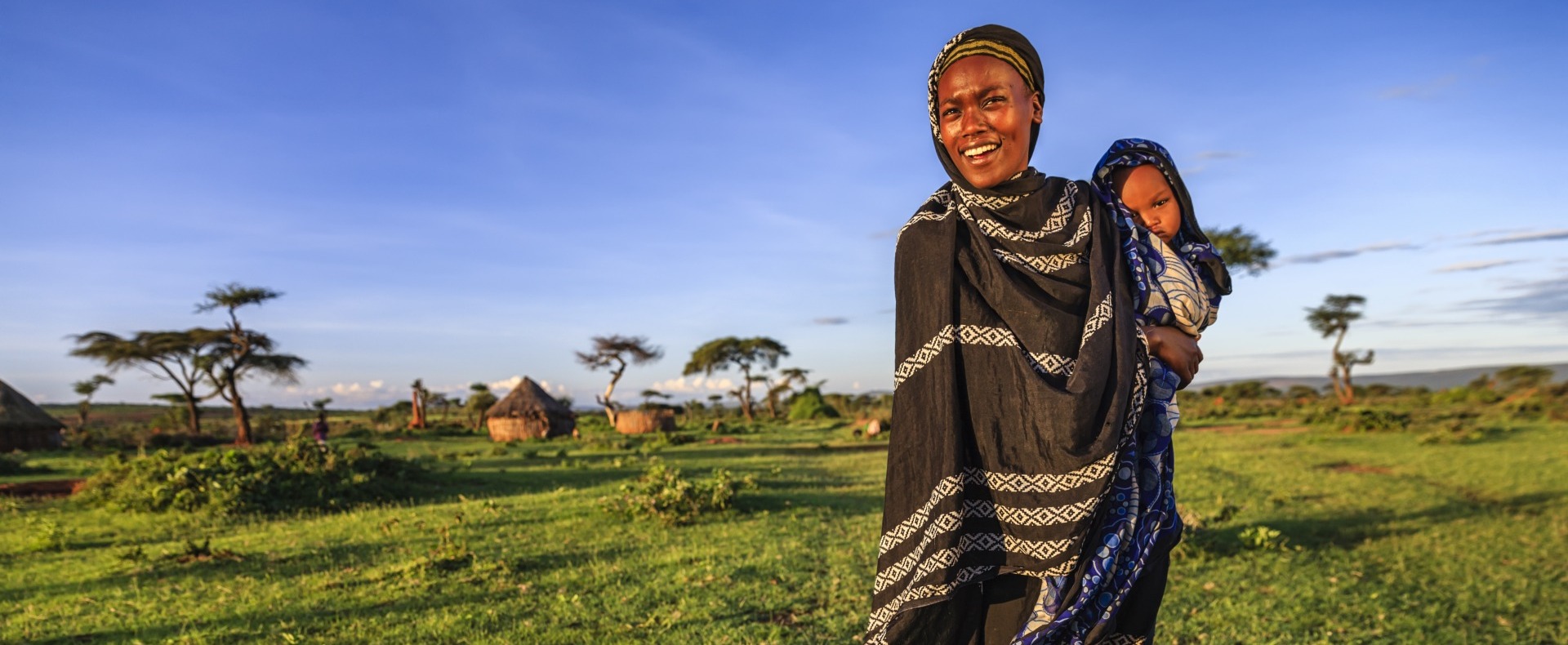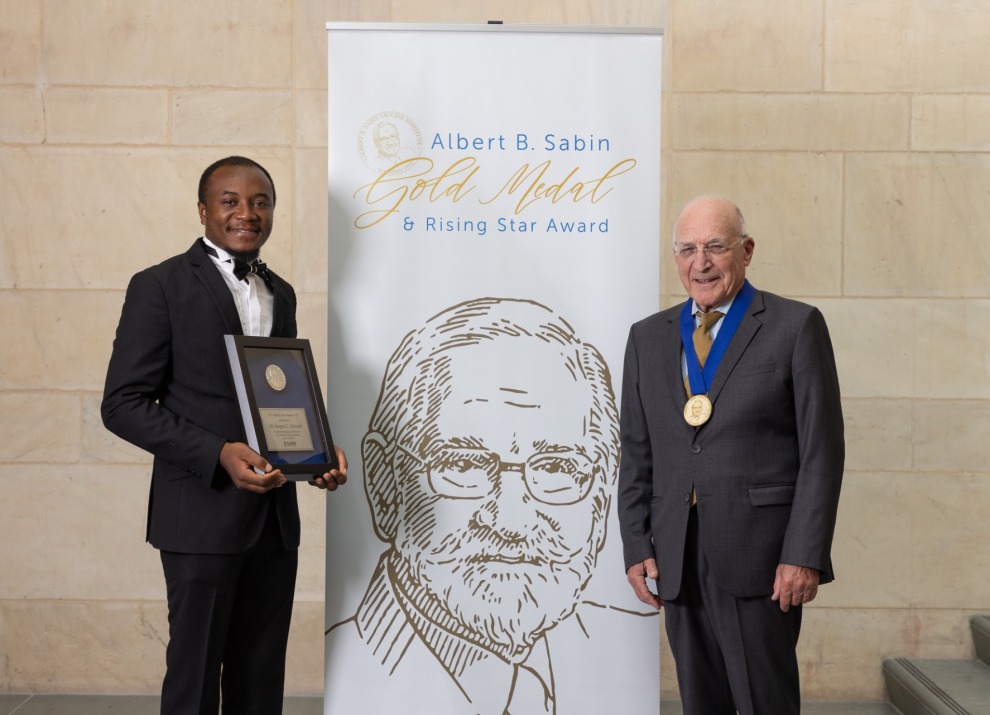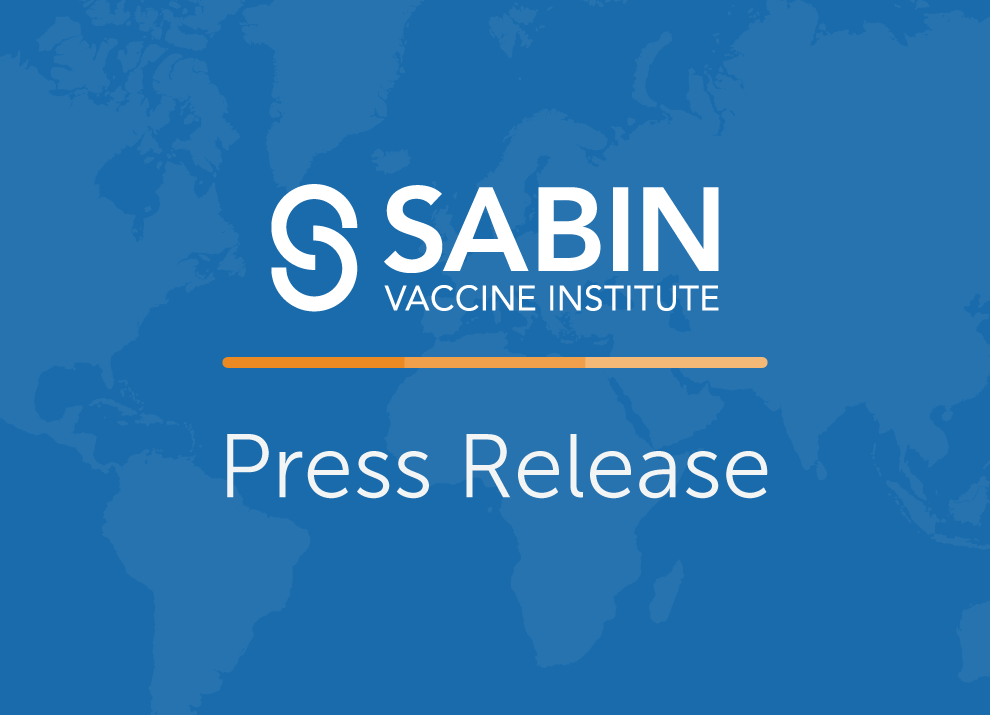Vaccinologists Keith Klugman and Shabir Madhi Awarded Sabin’s Prestigious Gold Medal; Infectious Diseases Epidemiologist Nicole Basta Receives Rising Star Award

Washington, D.C. – The Sabin Vaccine Institute today presented the Albert B. Sabin Gold Medal to physician-researchers Keith Paul Klugman and Shabir Ahmed Madhi, and its Rising Star award to infectious diseases epidemiologist Nicole Elaine Basta at a ceremony in the National Academy of Sciences building in Washington D.C.
Klugman and Madhi received the Sabin Gold Medal, one of the highest recognitions for vaccinologists globally, for their seminal combined contributions to the development of vaccines against pneumonia and diarrheal disease – major causes of death in children in low- and middle-income countries (LMICs). Klugman first met his then-graduate student Madhi at South Africa’s University of the Witwatersrand (also known as Wits University), where Klugman established, and Madhi expanded, a now globally renowned infectious diseases research institute. Apart from pneumonia, their work focused on maternal and children’s vaccines including influenza, respiratory syncytial virus (RSV), typhoid, and Group B streptococcus (GBS).
The evidence produced by these two awardees has and continues to inform the World Health Organization’s recommendations for vaccines. Klugman and Madhi’s research has helped pave the way for the introduction of lifesaving vaccines in public immunization programs – including the pneumococcal conjugate vaccine where their findings were pivotal in influencing vaccination policy in many LMICs.
“I am honored to award the Sabin Gold Medal to Dr. Klugman and Dr. Madhi for their extraordinary work on vaccines that have saved lives in communities most in need of these interventions,” says Amy Finan, Sabin’s chief executive officer. “Their pneumonia research has been particularly transformative in shaping our understanding of the disease and strengthening global health strategies to protect children from this vaccine-preventable disease.”
“When I look down the list of previous awardees, I recognize the great majority of them, and it is extraordinary to now be numbered among them.” – Dr. Keith Klugman
Fueled by an early interest in science as a child in South Africa — in part due to a physician father – Klugman holds both a medical as well as a science doctorate degree from Wits University and was the first student in the school’s history to obtain them simultaneously. He began his research career nearly five decades ago investigating the typhoid vaccine and has since distinguished himself as a formidable infectious diseases’ scientist. Klugman is widely known for his work on pneumonia, which still kills a child under five every 43 seconds, many in the world’s poorest countries. As the director of the pneumonia program at the Seattle-based Bill and Melinda Gates Foundation, Klugman orchestrates strategic initiatives aimed at reducing deaths from pneumonia, RSV, neonatal sepsis, and meningitis. He has authored hundreds of publications that have been cited over 50,000 times to date and has been elected to the National Academy of Medicine in the United States. Klugman is also a professor emeritus of global health at Atlanta’s Emory University.
His scientific achievements aside, Klugman has long championed the need for the world’s poorest children to have equitable access to vaccines. While in South Africa he joined in Wits University’s struggle to allow access to the institution for all students.
“It is absolutely wonderful to be receiving this award, especially together with Shabir,” he says. “When I look down the list of previous awardees, I recognize the great majority of them, and it is extraordinary to now be numbered among them.”
“It makes me realize that the work my team and I have done is acknowledged by my peers as being of substance.” – Dr. Shabir Madhi
With a career spanning more than 25 years, Madhi, also from South Africa, is a trained pediatrician whose research continues to be instrumental in prioritizing the rollout of vital vaccines and guiding global public health policies. At Wits University, he led clinical trials focused on respiratory and meningeal pathogens, including vaccines targeted at pregnant women and their unborn babies. Madhi led the first study showing that a rotavirus vaccine could significantly prevent severe diarrhea during the first year of life in African infants. That research served as a key piece of evidence for the WHO’s recommendation of universal rotavirus vaccination. In addition, he also led the first two COVID-19 vaccine trials in Africa, and a number of COVID-19 epidemiology studies which led to the first evidence suggesting that infection-induced immunity and vaccinations played a role in reducing severity of disease.
Madhi heads South Africa’s widely respected South African Medical Research Council (SAMRC) Vaccines and Infectious Diseases Analytics Research Unit (Wits VIDA) and is a professor of vaccinology at Wits. He too has co-authored hundreds of publications which have been cited over 59,000 times. Madhi is a recipient of numerous lifetime achievement awards in South Africa, as well being bestowed an Honorary Commander of the Order of the British Empire (CBE) from the British Government for his services to science and public health in a global pandemic.
“It is really humbling for me to be acknowledged for my contributions in the field of vaccinology along with those who have received the Gold Medal award,” says Madhi. “It makes me realize that the work my team and I have done is acknowledged by my peers as being of substance. Most significantly, we contributed to protecting lives in those settings where a majority of death and suffering occurs, and that is in LMICs.”
Sabin’s 2024 Rising Star Nicole Basta, an associate professor at Canada’s McGill University and Canada Research Chair in Infectious Disease Prevention, has led numerous studies to evaluate the impact of vaccines and vaccination programs for a number of globally challenging viral and bacterial diseases, including COVID-19, meningococcal disease, influenza, and HPV.
Inspired by her parents’ emphasis on the importance of education, Basta is a first-generation college graduate who earned an undergraduate degree at Princeton University and graduate degrees at the University of Cambridge and the University of Washington. She has distinguished herself as a prolific researcher with a focus on assessing the impact of vaccination programs and increasing vaccine awareness, acceptance, and uptake. She designed and led studies to evaluate the impact of the meningococcal A vaccine MenAfriVac in Mali and the meningococcal B vaccine Bexsero in the US, both of which contributed to better understanding about how to best implement vaccination programs. In 2020, she and a colleague developed an interactive online COVID-19 vaccine tracker, providing real-time updates to millions of users around the world on the pandemic vaccine development progress.
“This recognition is also a testament to the outstanding collaborators and trainees I have had the privilege to work with and it motivates us to continue to make a difference in the years ahead.” – Prof. Nicole Basta
“Prof. Basta’s impactful and policy-shaping epidemiological research benefits from her ability to make it accessible and useful to the global health community. The COVID-19 vaccine tool is one such instance,” says Finan. “Those achievements alone would make her deserving of the Rising Star but there’s more: she also demonstrates a deep commitment to mentoring the next generation of public health researchers through her research group which is exactly the kind of emerging leader we need.”
Once an infectious diseases outbreak investigator with the Florida Department of Health, Basta has first-hand knowledge that scientific research needs to be understood and adopted beyond the confines of academia. She works with policy makers and public health agencies and organizations to translate research findings into actionable strategies for disease prevention and control.
“It’s truly an honor to receive the 2024 Rising Star Award from the Sabin Vaccine Institute, especially since I am deeply committed to ensuring that we have the evidence we need to demonstrate the importance of vaccination and increase access and uptake,” says Basta. “This recognition is also a testament to the outstanding collaborators and trainees I have had the privilege to work with and it motivates us to continue to make a difference in the years ahead.”
The Gold Medal is Sabin’s highest scientific honor. It has been given annually for more than three decades to a distinguished member of the global health community who has made exceptional contributions to vaccinology or a complementary field. Past award recipients include leaders of vaccinology and vaccine advocacy such as Drs. Barney Graham, Carol Baker, Bill Foege, Anne Gershon, Stanley Plotkin, and Kathrin Jansen.
Sabin’s Rising Star award was created in 2020 to encourage and recognize the next generation of vaccine and immunization leaders.
Media Contact:
Monika Guttman
Senior Media Relations Specialist
Sabin Vaccine Institute
+1 (202) 662-1841
press@sabin.org
About the Sabin Vaccine Institute
The Sabin Vaccine Institute is a leading advocate for expanding vaccine access and uptake globally, advancing vaccine research and development, and amplifying vaccine knowledge and innovation. Unlocking the potential of vaccines through partnership, Sabin has built a robust ecosystem of funders, innovators, implementers, practitioners, policy makers and public stakeholders to advance its vision of a future free from preventable diseases. As a non-profit with three decades of experience, Sabin is committed to finding solutions that last and extending the full benefits of vaccines to all people, regardless of who they are or where they live. At Sabin, we believe in the power of vaccines to change the world. For more information, visit www.sabin.org and follow us on X, @SabinVaccine.
Recommended for you

We make vaccines more accessible, enable innovation and expand immunization across the globe.






